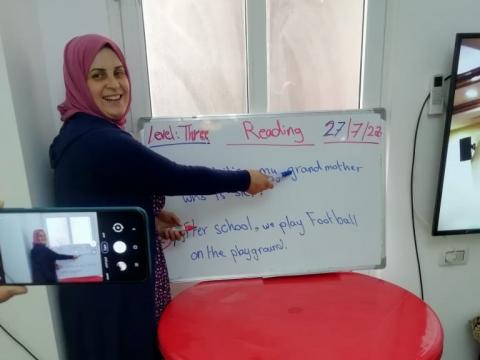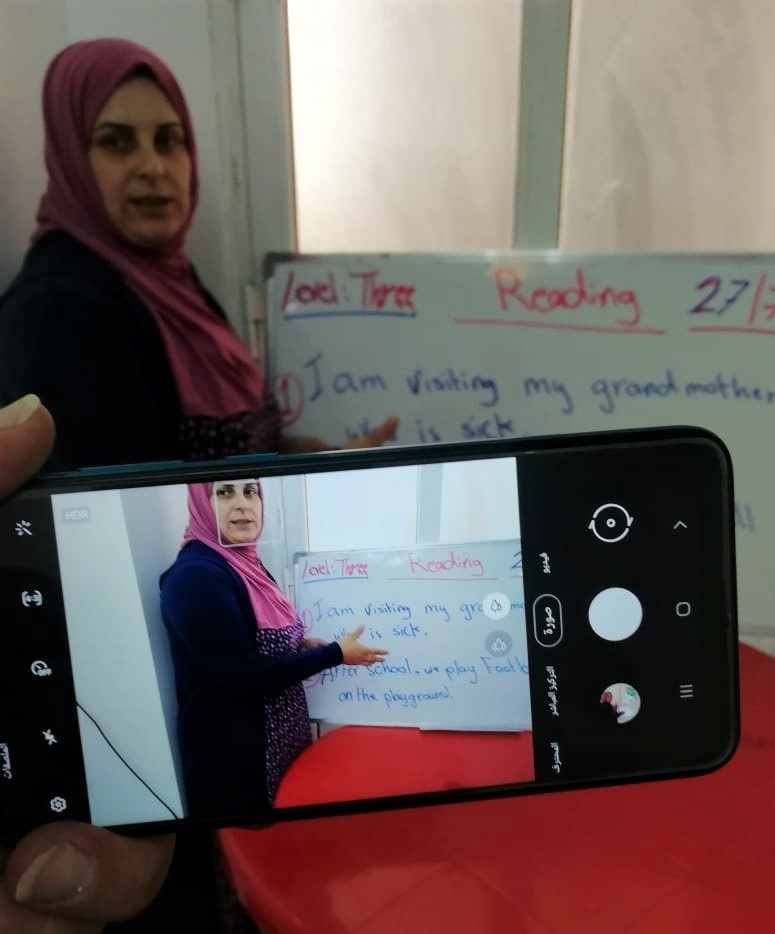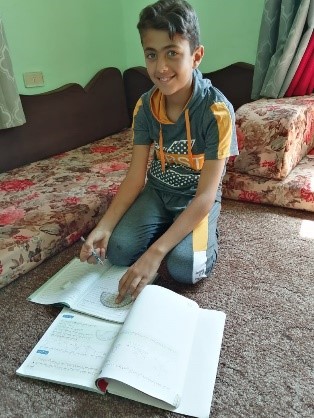Learning continues uninterrupted midst COVID-19 in Jordanian public schools

In a world where one person is forced to flee every three seconds due to persecution, conflict, violence or human rights violations[1], the Syria crisis is the largest refugee and displacement crisis of our modern time. The vast majority of the 6.7 million Syrian refugees[2] sought refuge in neighbouring countries such as Jordan, where public services have been strained by a significant influx of refugees. In Jordan[3], the public education system accommodates Syrian refugees by increasing the number of schools that run two shifts per day. However, overcrowdedness has had an effect on the quality of education services provided in public schools; vulnerable Syrian and Jordanian children are facing the increased risks of dropping out of schools.
After the COVID-19 outbreak in the country in March, the situation has worsened for the vulnerable children. Jordanian public schools have been closed since 15 March 2020, in compliance with the nationwide lockdown so as to mitigate and prevent the spread of COVID-19. The Jordanian government has taken all measures to ensure that children can continue education in the face of the lockdown, by providing lessons broadcasted on TV and available on online platforms, as well. Still, in World Vision’s Rapid Needs Assessment, 76 percent of the respondent Syrian refugee families, comparably higher than the Jordanian respondents, reported they felt their children needed support during school closure. The respondents shared comments and concerns such as “children need a thorough and detailed explanation”; “my child needs help and follow up on reading and writing”; “my oldest daughter refuses to sit in front of the TV and study”; “my child needs a slow, detailed video explanation”; and “I need support to keep my child occupied with educational activities so that his learning doesn’t become interrupted”.
With the aim of preventing children who struggle with learning from dropping out of school in Jordan, World Vision has been providing remedial education, funded by Japan Platform, in public schools since 2014. For vulnerable children like those whom World Vision’s remedial programme targets, the longer their education is interrupted, the more likely they will not return to school once school reopens.
To minimise expanding the learning gap between advanced and struggling students, we started the remote remedial education programme on 19 April 2020. To date, 567 children have participated in our remote remedial lessons which are tailored to the level of students’ understanding.
First of all, World Vision’s remedial class teachers were trained on how to conduct remedial classes remotely utilising WhatsApp and ZOOM applications (online video conferencing system) and how to increase the effectiveness of learning remotely. The teachers have been providing lessons through videos and worksheets, along with an interactive ZOOM session conducted once a week.
One of our remedial class teachers, Nahed, joined World Vision’s remedial education programme in 2015, teaching English to over 550 students in total to this date. At the beginning, she was worried about teaching her students from a distance and how effective it would be.

...after I’ve started teaching from home, I’ve noticed that it was a totally different experience than I thought. It feels like I have my students in a classroom
“I had so many concerns regarding the remote teaching methods such as how I can prepare lessons and explain them remotely, how I can communicate with my students, and how they can receive the information properly. But after I’ve started teaching from home, I’ve noticed that it was a totally different experience than I thought. It feels like I have my students in a classroom because of the interactions among the students and myself over the WhatsApp groups. Since my students are sending their homework and recorded voices in addition to participating in weekly ZOOM sessions, I can see that the students are understanding the lessons I share and receiving the material properly. I feel happy when I see my students very responsive over the WhatsApp groups, and when they submit their homework correctly and share it with me on time.”
Nahed continued to share a unique experience she had during her time working from home: “I always try to make the classes I deliver from home feel and look similar to a classroom in school. One time, when I closed the door to start the lesson, all of a sudden my kids started knocking on the door and making noises during the ZOOM session, which made my students laugh.”
With the efforts made by the remedial class teachers, the target students are now beginning to show positive changes in their learning skills.
“For English, I’ve come to notice that the students in level one have improved their writing skills, and the students in level two and three have advanced a lot in both writing and reading skills,” said Nahed.
Abdulrahman is an 11-year-old Syrian boy who joined World Vision’s remote remedial programme in April. Before the lockdown, he was struggling with learning in a public school, and then was enrolled in our programme based on his mid-term exam results. During the school closure, he missed a couple of remote classes provided by the Ministry of Education (MoE), and was facing difficulty in completing his homework, which required the use of a protractor.

I didn’t know how to use a protractor... But thanks to my Math remedial class teacher who covered this lesson, I can now measure many angles using the tool
“I didn’t know how to use a protractor for my homework because I missed the Darsak classes (online public school lesson) that taught how to use it. But thanks to my Math remedial class teacher who covered this lesson, I can now measure many angles using the tool,” said Abdulrahman. He proudly sent his math teacher a video presenting how he can measure every angles in any homework using his protractor.
“The way remedial class teachers explain lessons is perfect and easy to understand for Abdulrahman. They are helping him a lot to learn and catch up with Darsak lessons,” Abdulrahman’s mother shared.
Whether it is the use of a protractor or how to read Arabic letters, a small success story like Abdulrahman’s experience is quite important for a child to stay motivated and confident when studying. Such moments of a small achievements will encourage children to go back to schools once they are reopened and to continue learning, which leads to a brighter future.
...our team is striving every day to keep our educational activities up and running during COVID-19, so that more and more students can experience a moment of success like how Abdulrahman did during the time of school closure
Sayo Matsuzaki the Project Manger concludes: “It is the first experience for our team, as most of them are also working from home, to convert the programme into a remotely-implemented one. It is not easy, yet our team is striving every day to keep our educational activities up and running during COVID-19, so that more and more students can experience a moment of success like how Abdulrahman did during the time of school closure.”
[2] UNHCR Syria Refugee Crisis Explained
[3] Jordan Response Plan 2019 – Situational analysis Education p.10